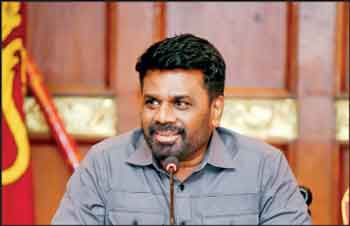Saturday Feb 21, 2026
Saturday Feb 21, 2026
Saturday, 18 January 2025 01:08 - - {{hitsCtrl.values.hits}}
 |
| President Anura Kumara Dissanayake |
Dissanayake has pledged to introduce more equitable economic policies and to repeal the notoriously abusive Prevention of Terrorism Act, but he has not backed accountability for widespread rights violations during Sri Lanka’s 1983-2009 civil war between the Government and the separatist Liberation Tigers of Tamil Eelam (LTTE).
For the 546-page world report, in its 35th edition, Human Rights Watch reviewed human rights practices in more than 100 countries. In much of the world, Executive Director Tirana Hassan writes in her introductory essay, Governments cracked down and wrongfully arrested and imprisoned political opponents, activists, and journalists.
Armed groups and Government forces unlawfully killed civilians, drove many from their homes, and blocked access to humanitarian aid. In many of the more than 70 national elections in 2024, authoritarian leaders gained ground with their discriminatory rhetoric and policies.
“Sri Lanka’s multiple crises are connected by entrenched impunity for rights violations, discrimination against minority communities, and laws and institutions that seek to silence critics,” said Human Rights Watch Deputy Asia Director Meenakshi Ganguly. “President Dissanayake has an opportunity to make real progress on rights if he carries out his campaign pledges, but he also needs to address the legacy of past conflicts and continuing abuses against Tamils, Muslims, and others on which he has been troublingly silent.”
• While an International Monetary Fund (IMF) bailout helped stem the immediate crisis after the Sri Lankan Government defaulted on its foreign debt in 2022, the United Nations estimated that a quarter of households were suffering food insecurity in 2024.
• Policies pursued by the outgoing administration of President Ranil Wickremesinghe under the IMF program shifted the burden of recovery largely onto people with low incomes. The Dissanayake Government has pledged to combat corruption and create more equitable economic policies.
• Police and other security agencies harassed and threatened activists and human rights defenders with impunity during 2024, particularly in predominantly Tamil areas in the north and east, including undue restrictions and interference in the financing of civil society organisations.
• In May, the UN human rights office issued a report calling for the international community to undertake prosecutions and other accountability measures to address thousands of unresolved cases of enforced disappearance that occurred over decades during the Janatha Vimukthi Peramuna (JVP) uprisings, and the LTTE armed conflict. The UN Human Rights Council has extended a mandate to monitor human rights violations and collect evidence of crimes during the civil war.
President Dissanayake should begin to address Sri Lanka’s many human rights problems by fulfilling and building upon the pledges he made during his party’s election campaigns, HRW added.